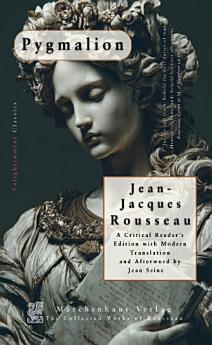Pygmalion
Tungkol sa ebook na ito
Not to be confused with more famous works by the same name, Pygmalion is a "scène lyrique" composed by Rousseau before 1770 and marks a significant, if often overlooked, moment in his artistic trajectory. After a period of intense philosophical output and subsequent persecution, Rousseau returned to Paris in 1770, largely supporting himself through music copying. It was in this later phase of his life that Pygmalion saw its first performance by amateurs at the Hôtel de Ville in Lyon. Rousseau, initially hesitant about his musical skill for the piece, collaborated with the amateur composer Horace Coignet, who provided the score and overture, allowing Rousseau's innovative dramatic vision to materialize.
This work stands as a pivotal early example of melodrama, a theatrical form combining spoken word with musical accompaniment, and it significantly influenced the genre's development, particularly in German-speaking regions. Rousseau's adaptation of Ovid's myth of Pygmalion is notable for its radical departure from tradition: his Galatea comes to life not through divine intervention, but through the sculptor's final chisel stroke, uttering "me" upon self-recognition and then "Me again" upon recognizing her creator. This reinterpretation underscores Rousseau's enduring philosophical interest in mimesis and the power of human imagination, shifting the focus from divine grace to human agency and the subjective experience of coming into being. The piece thus embodies his broader intellectual project, where music, as a vehicle for feeling, could convey meaning as potently as written thought, aligning with the burgeoning "Age of Sensibility."
This modern critical reader's translation from the original French manuscripts includes supplementary materials that bring Rousseau's world and impact to life. This professional translation delivers scholarly depth with amplifying materials. This Reader's Edition includes an illuminating afterword tracing Rousseau's intellectual relationship with Diderot, Voltaire and his reception by Nietzsche, revealing the fascinating dialogue between the period's most influential minds. A comprehensive timeline connects the major events of Rousseau's life with world events, an glossary of Enlightenment terminology frames Rousseau's debates in the intellectual milieu of his day, and a detailed index provides an authoritative guide to his complete writings.











